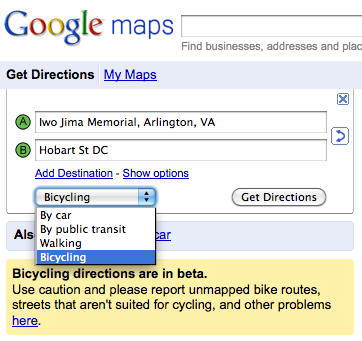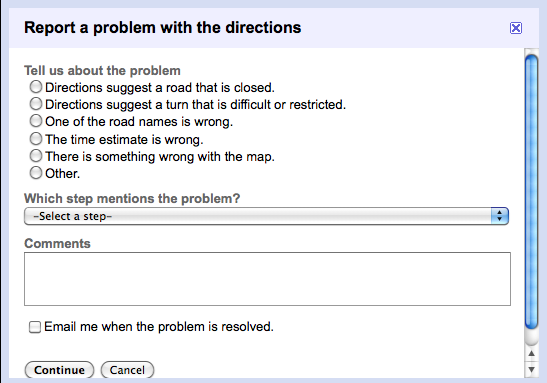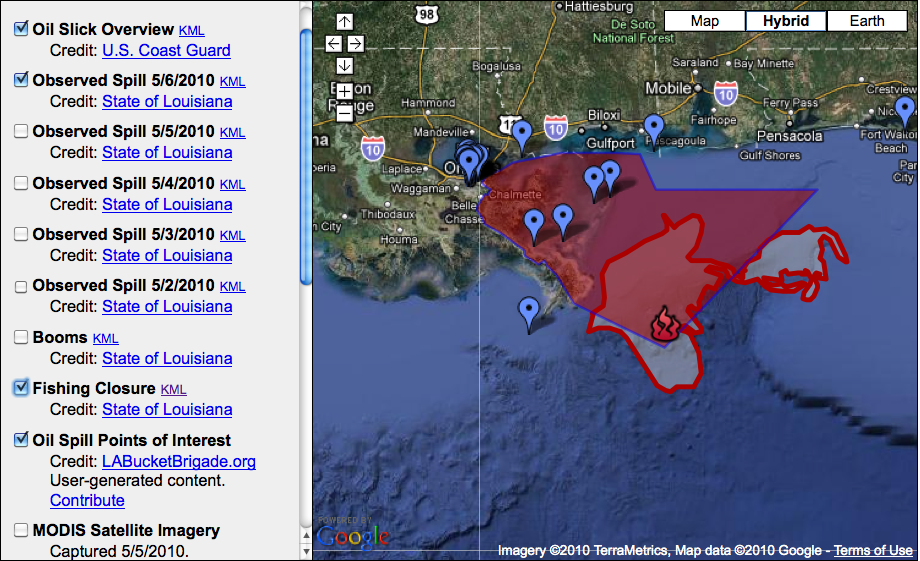Google added recently the Gulf of Mexico Oil Spill to their Crisis Response site. It has overlay maps with satellite images, closures, news, etc.
Google Stops Censoring Search Results in China
 Following up on Google’s promise from January 12th, Google China just moved its web servers for China to Hong Kong so that they can be run without censorship. Now it is up to Chinese authorities to decide to shut off all or partial access to Google.
Following up on Google’s promise from January 12th, Google China just moved its web servers for China to Hong Kong so that they can be run without censorship. Now it is up to Chinese authorities to decide to shut off all or partial access to Google.
Although Google is not the largest search engine in China*, Google’s many services (web search, mail, documents from Google Docs, photos, etc) are heavily used. If Chinese authorities shut off access to the servers completely, there would be a lot of pissed off Chinese geeks.
* Traffic market share of search engines in China, August 2009, China Internet Network Information Center:
Baidu: 51.5%
Google: 32.9%
Sohu: 4.6%
Sina: 4.0%
Yahoo: 3.7%
Others: 3.3%
Google blog post announcement of decision.
From the Washington Post:
Google stops censoring search results in China by Ellen Nakashima and Cecilia Kang
Google announced Monday that it had stopped censoring search results on its site in China and redirected users to an unfiltered search based in Hong Kong.
The company said in January that it was holding talks with authorities in China to determine whether “it could operate an unfiltered search engine within the law, if at all.” On Monday, Google said the government in Beijing “has been crystal clear throughout our discussions that self-censorship is a non-negotiable legal requirement.”
The announcement Monday effectively represented an attempt by Google to sidestep China’s demands for self-censorship on its Chinese-language site, google.cn.
Hong Kong is a special administrative region of China and operates its own economic and political systems. By redirecting Chinese search traffic through servers in Hong Kong, to google.com.hk — the firm said it had effectively transferred the jurisdiction of its search business off the mainland.
“This move is entirely legal by Chinese law and Hong Kong law and that is important to know: that we are abiding by the law,” a source at Google said on condition of anonymity.
In its announcement on its Web site, the firm said that it belived its new approach was a “sensible solution.”
“We very much hope that the Chinese government respects our decision, though we are well aware that it could at any time block access to our services,” Google said.
The company said it will also monitor access issues and publicly disclose any time the services Google offers are made unavailable in China.
It remains unclear whether the world’s largest Internet search firm will leave China entirely, as it has said it might be forced to do. The company said it has no plans to pull staff from the country.
Biking Directions with Google Maps
Google recently added biking directions with Google Maps. See Bicycling as a drop-down option when looking for directions.

Beta Warning
The yellow note at the bottom to use caution isn’t just for legal reasons. Many have reported mistakes, such as directions to bike through Arlington Cemetery.
But, like everything Google, it seems to get better over time. People report these mistakes to Google by either clicking the here link at the bottom of the Beta warning or clicking Report a Problem at the bottom right of any Google Map.

With the snow melting away in DC, it should be fun to bike again soon. Give Google Maps biking directions a try.
Haiti Disaster Relief
Google’s Crisis Response page for the Haiti earthquake has news, donation links, maps, satellite imagery, videos, and a Person Finder tool to look for or report on missing people.
This video is from the White House Haiti Earthquake Relief site:
Don’t Use Internet Explorer
 I used to tell people that the newest Internet Explorer 8 was safe enough. But recent events have changed my mind. The Chinese attacks on Google over Christmas were perpetrated using a vulnerability that exists in all versions of Internet Explorer. Microsoft still hasn’t fixed this.
I used to tell people that the newest Internet Explorer 8 was safe enough. But recent events have changed my mind. The Chinese attacks on Google over Christmas were perpetrated using a vulnerability that exists in all versions of Internet Explorer. Microsoft still hasn’t fixed this.
Because of security concerns, both the German and French governments have officially recommended that people not use Internet Explorer. One could attribute this to the EU’s dislike of Microsoft, but Mircrosoft has a more fundamental problem.
Closed Source
Many people say that Internet Explorer isn’t as safe because it has the largest market share (over 60%). Hackers want to attack the largest market they can. But I think that the real problem is that Internet Explorer is written with closed source code.
Unlike the Gecko engine powering Firefox or the Webkit engine powering Chrome and Safari, Internet Explorer has its own broswer engine that is closed source. This means that people can not look at how it is written. While you might initially think that this makes Internet Explorer more protected, it’s actually the opposite. Open source code can be reviewed and improved by the entire development community. Once a problem is seen, any developer can suggest a solution. The response time of Firefox for fixing exploits is typically days compared to Internet Explorer taking weeks or months.
Other Browsers
The fastest browsers use Webkit as their engine. These include Google’s Chrome and Apple’s Safari browsers.
Mozilla Firefox is slower but remains the current leader among alternative browsers, largely due to its popular add-ons. Google is working on growing out its extensions to compete with Firefox add-ons.
Give one or more of these browsers a try.



